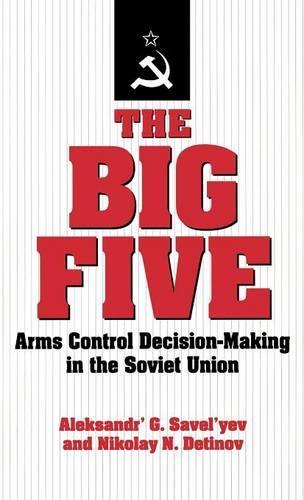
The Big Five: Arms Control Decision-Making in the Soviet Union
(Hardback)
Publishing Details
The Big Five: Arms Control Decision-Making in the Soviet Union
By (Author) Alexander' G. Savel'yev
By (author) Nikolay N. Detinov
Bloomsbury Publishing PLC
Praeger Publishers Inc
30th March 1995
United States
Classifications
Tertiary Education
Non Fiction
Central / national / federal government policies
Political structure and processes
327.1740947
Physical Properties
Hardback
224
Width 140mm, Height 216mm
510g
Description
Based primarily on the authors' personal experiences, this is the first study to reveal the inside story of how arms control decisions were made in the former Soviet Union. Savel'yev and General-Lieutenant Detinov participated directly in the decision-making process from 1969, when the Big Five was established, to the end of 1991, when the USSR was dissolved. They pay special attention to activities of the Politburo Commission for the Supervision of the Negotiationsthe Big Fiveand its working body, the interagency group known as the Five. They describe the key moments and main changes in the Soviet positions at SALT-I, SALT-II, INF, START, and DST.
Reviews
"That this book was written is astonishing. That we here in the West have the opportunity to read it is just short of a miracle. The Big Five is an insider's book written by two men within one of the most secret establishments of the 20th century, the Soviet arms control leadership. Its existence is testament to the extraordinary changes we have witnessed in the past few years--above all, of course, the end of the Soviet Union, for which this information would have been as closely guarded as the capabilities of the weapons themselves."-From the foreword by Ambassador Paul H. Nitze
The authors have demonstrably met their own objectives: to investigate how arms-control decisions were made, by whom, and how they were implemented.-The International History Review
This book is an insider's account of the Soviet arms control and disarmament decision-making process from the end of the 1960's until 1991--the year the Soviet Union ceased to exist....(It) does a good job of concisely describing the multitude of complicated issues that both sides had to address in the negotiations involving nuclear weapons (SALT I & II, START, the ABM Treaty, INF Treaty, and DST--Defense and Space Talks).-The Russian Review
While (the authors) are frank in admitting the twisted logic in some of their demands and, at times, even prevarication of their side, in the end they do not lend much support to those who viewed the Soviet stake in strategic arms control as a cynical subterfuge to secure unilateral advantage at every turn. The truth seems to have been the opposite. Yes, Soviet leaders sought the best deal they could get and resisted yielding any of their military advantages, but, when their demands looked like an attempt to disadvantage the United States seriously, they were usually reacting to their own black, worst-case assumptions about U.S. programs and intentions.-Foreign Affairs
"This book is an insider's account of the Soviet arms control and disarmament decision-making process from the end of the 1960's until 1991--the year the Soviet Union ceased to exist....(It) does a good job of concisely describing the multitude of complicated issues that both sides had to address in the negotiations involving nuclear weapons (SALT I & II, START, the ABM Treaty, INF Treaty, and DST--Defense and Space Talks)."-The Russian Review
"The authors have demonstrably met their own objectives: to investigate how arms-control decisions were made, by whom, and how they were implemented."-The International History Review
"While (the authors) are frank in admitting the twisted logic in some of their demands and, at times, even prevarication of their side, in the end they do not lend much support to those who viewed the Soviet stake in strategic arms control as a cynical subterfuge to secure unilateral advantage at every turn. The truth seems to have been the opposite. Yes, Soviet leaders sought the best deal they could get and resisted yielding any of their military advantages, but, when their demands looked like an attempt to disadvantage the United States seriously, they were usually reacting to their own black, worst-case assumptions about U.S. programs and intentions."-Foreign Affairs
Author Bio
ALEKSANDR' G. SAVEL'YEV is vice president of the independent Institute for National Security and Strategic Studies in Moscow. Savel'yev participated in the Soviet-American Nuclear and Space Talks in Geneva as an advisor to the Soviet delegation and as a representative of the Academy of Sciences of the USSR. He is the author of a number of scholarly works on strategic and security issues and a member of the International Institute of Strategic Studies in London. NIKOLAY N. DETINOV, during the period from the end of the 1960s until the early 1990s, was among a handful of individuals actively involved in crafting the Soviet position for arms control negotiations. He was one of a small group which evolved into the Big Five. He oversaw the creation of its decision-making mechanisms and participated in its day-to-day operations. He participated in the Vladivostok Summit between Brezhnev and Ford (1974), the Helsinki Conference (1976) and the Soviet American Nuclear and Space Talks (START, INF, and Defense and Space, 1985-1991). General Detinov is presently a senior analyst in a scientific center of the Russian Academy of Sciences and a participant in the Russian-American joint Global Protection Program.
